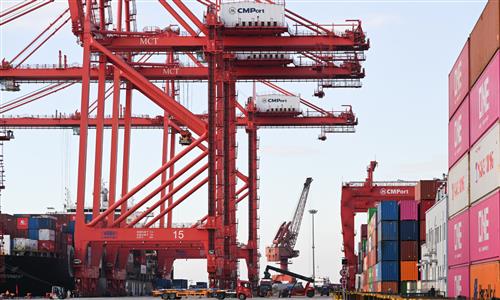Endeavors to uphold openness and stabilize China-US relationship should extend to the grassroots level

A file photo of Shenzhen, South China's Guangdong Province. Shenzhen is one of the earliest special economic zones and is referred to as the "window" on China's reform and opening-up drive. Photo: VCG
Editor's Note:
Over the past 45 years of reform and opening-up, China has embarked on a distinctive path toward economic development, achieving remarkable success. Despite the ever-changing international economic landscape and environment, China has achieved significant economic development and contributed to stable and positive forces for global economic growth.
As this year commemorates the 45th anniversary of China's reform and opening-up, Chinese economists noted that amid the growing tide of anti-globalization and protectionism, China's unwavering dedication to deepening reforms and expanding its opening-up will not only foster the high-quality development of its own economy but also enhance economic and trade cooperation with countries including the US. The achievements of China's agenda of reform and opening-up will persist in contributing to the stability of global economic governance.

He Weiwen, senior fellow of the Center for China and Globalization
On December 16, 1978, China and the US released the Joint Communiqué on the Establishment of Diplomatic Relations. Two days later, on December 18, 1978, the Communist Party of China (CPC) convened the third plenary session of the 11th CPC Central Committee, which signaled the beginning of China's reform and opening-up.
These two events were not merely coincidental, but rather had a clear and practical connection. The normalization of China-US relations not only offered a stable international environment for China, but also paved the way for numerous tangible measures aimed at fostering mutually beneficial cooperation.
Joining the World Trade Organization (WTO) was a pivotal and momentous milestone for China's reform and opening-up. During this period, I had the privilege of serving as the Economic and Commercial Counselor at the Chinese Consulates General in San Francisco and New York, where I had extensive engagements with local American authorities and businesses.
During that period, we were primarily focused on two key objectives: fostering the advancement of China-US bilateral relations and analyzing the necessary steps for China to become a member of the WTO. We dedicated significant resources and exerted considerable effort toward these endeavors, recognizing the paramount significance of a robust and harmonious China-US partnership for China's overall progress and reform.
In recent years, the relationship between China and the US has been characterized by tension and discord. However, it is imperative that we make concerted efforts to stabilize this relationship. Following the China-US summit meeting in San Francisco, a glimmer of hope for easing tensions has gradually emerged.
Moving forward, it is essential to prioritize the preservation of China's integration within global supply chains and the continuation of reform and opening-up. These factors will undoubtedly play a pivotal role in shaping the future of China-US relations.
On one hand, the US is reluctant to allow China, with different ideological values, to further its growth and expansion. The US doesn't want to let China's cutting-edge technology affect its hegemony, nor will it permit China's Belt and Road Initiative and other international policies to affect the order led by the US. However, on the other hand, there are still areas of potential cooperation between the two nations.
We should work toward stabilizing tensions, alleviating pressure, and fostering greater cooperation. This requires close collaboration with the American business community, education sector, and civil society. Our endeavors to uphold openness and stabilize the China-US relationship should not solely concentrate on the US government, but also extend to the grassroots level.
Based on my experience working in the US and interacting with state governments and businesses, I strongly believe in the potential for collaboration at the local level. Even if the White House and Congress have their own agenda toward China, it is crucial to foster bilateral cooperation at grassroots and civil levels.
There have been numerous instances where businesses have exerted influence and driven changes. For instance, in the chip industry and other related sectors, local changes were eventually implemented due to the pressure and advocacy from businesses.
Therefore, it is essential to prioritize engagement and collaboration with local governments and businesses community. By doing so, we can address pressing issues and drive positive change. The US government insists that we should open up our economy to meet their domestic requirements, whereas China's approach to opening-up is driven by international obligations, such as those outlined by the WTO and the Regional Comprehensive Economic Partnership (RCEP). In terms of safeguarding intellectual property rights, we have actively engaged in numerous conventions and international organizations dedicated to intellectual property. Our commitment lies in adhering to international standards, rather than simply following the lead of the US.
We have been consistently working toward reform and opening-up. The General Office of the Ministry of Commerce has recently released a letter addressing the "unjustifiable disparities in treatment between domestic and foreign investment," which is a positive step and reflects our commitment to furthering reform and open up. Moving forward, we must unwaveringly advance with our reform and opening-up efforts, as our success in these areas will lead to an improved external environment.



